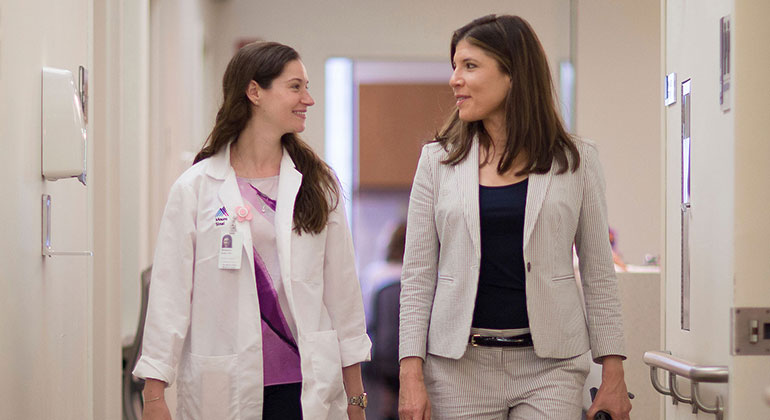Women’s Lung Cancer Program
According to the National Cancer Institute, the three most common cancers for women are breast, lung, and colorectal, accounting for an estimated 50% of all new cancer diagnoses in women in 2020. The estimated number of new cases of breast cancer in women in 2020 is 276,480; the estimated number of new cases of lung cancer in women in 2020 is 228,820.
At Mount Sinai Women’s Lung Cancer Program, we recognize lung cancer as a significant women’s health issue. For that reason, we focus on creating a personalized approach to treatment. We acknowledge gender-specific issues in lung cancer to achieve the best possible results.
Causes and Risks for Women
Although smoking is the primary cause of lung cancer, women who have never smoked also get lung cancer. About 20 percent of women diagnosed with lung cancer have never smoked, while about 10 percent of men with lung cancer never smoked. The following might explain the reason for the relatively high number of lung cancer cases in women.
Non-smoker susceptibility: Lung cancer among women who have never smoked is often related to genetic mutations associated with non-small cell lung cancer. These mutations are more common among women than in men. They are associated with a more favorable prognosis—significantly better response and outcome to specific treatments—compared to patients without certain defined mutations.
Tobacco use: Smoking remains the major risk factor for most types of lung cancer. Smoking has decreased more among men than among women.
Smokers: Women appear to be at higher risk for smoking-related lung cancer than men. Women develop genetic mutations associated with more aggressive lung cancers in smokers at a younger age than men. And aggressive cancers tend to occur in women who smoked less than men.
Smoking cessation: Women face different barriers to quitting smoking than men. Women may worry more about weight gain, for instance. And data suggest that women rely more heavily on cigarette use to reduce stress and depression than men. Also, women tend to crave cigarettes when they experience hormone fluctuations related to ovulation, pregnancy, and menstruation. Finally, some smoking cessation programs have been shown to be less effective for women than men.
Treatment response: Studies show that women have better survival rates than men for non-small cell lung cancer. This holds true regardless of age, stage, or therapy. Women experience a survival advantage with surgery for early stage lung cancer, and with radiation and/or chemotherapy treatments for advanced lung cancer.
Support Services
The diagnosis of lung cancer can be frightening and difficult for you and your loved ones. Mount Sinai offers diagnosis, treatment, community outreach, education, and social support, and conducts research in lung cancer in women. Our support services—for nonsmokers and smokers—are available to you and your caregivers, family, and friends.
- Nonsmokers: We offer support groups, education, genetic testing, and the latest therapy options for nonsmokers who have been diagnosed with lung cancer.
- Smokers: We offer medication and information regarding smoking cessation programs, nutrition, support groups, education, genetic testing, and the latest therapy options for smokers who have been diagnosed with lung cancer.
The Women’s Lung Cancer Program at Mount Sinai can connect you with surgeons and oncologists specializing in lung cancer. You can be seen by a male or a female provider, whichever you prefer. We also offer access to Mount Sinai Women’s Health Services, which include a variety of medical and social service programs dedicated to issues in women’s health.
Treatment
Both early and some later stage lung cancers may benefit from minimally invasive surgery known as video assisted thoracic surgery (VATS). For this surgery, we make three, one-inch incisions on the side of the chest. Through these incisions, we can remove the entire tumor, a section of lung if needed, and associated lymph nodes. VATS surgery results in favorable cosmetic incisions, decreased pain, and a shorter hospital stay. We also offer other lung cancer treatments.
We provide state-if-the-art surgical and clinical care in a supportive and caring environment. We are here for you throughout your cancer journey.


